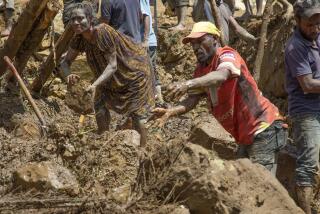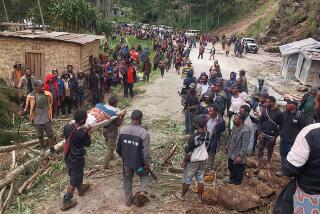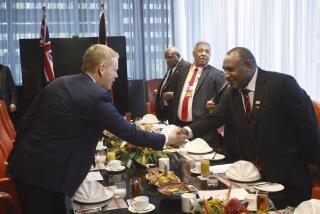Only Six Decades Away From Stone Age, Islanders Trade Fax Numbers : Papua New Guinea: Under a flaming orange headdress and clad in a loincloth, one native entrepreneur hands out business cards to foreigners seeking investment opportunities.
- Share via
MT. HAGEN, Papua New Guinea — Larry Andagali’s painted face smiled broadly under a spectacular headdress of flaming orange feathers.
A carved wooden club spiked with a razor-sharp claw of a flightless cassowary bird was tucked under his arm. He wore a loincloth of woven string and leaves.
“This is my fax number,” he said, handing out business cards to foreigners seeking investment opportunities in Mt. Hagen, a frontier town in the remote highlands of Papua New Guinea.
Andagali is the new face of this young nation with ancient traditions, a warrior turned executive. He and other indigenous entrepreneurs in Papua New Guinea, a region little known to the world before World War II, want to play a part in the global economy.
At 29, Andagali manages a company owned by 10 indigenous clans that collect joint royalties for natural gas pumped from their land. The clans, traditional enemies who fought each other for centuries, became partners in 1990 so the royalties could be used to create jobs and improve living conditions.
“The culture of business is a something new to the culture of my people,” Andagali said. The clans still fight, “but not as much as they used to and never about business.”
Western civilization was late in coming to Papua New Guinea. Some communities saw their first Europeans only a few generations ago and are only “60 years from the Stone Age,” said Julius Chan, deputy prime minister and foreign minister.
Most of the 4 million people still live in traditional villages, even though Papua New Guinea has one of the world’s fastest-growing economies. Because of a boom in the development of natural resources, the gross domestic product grew by 14.4% in 1993.
Geologists regard the island nation just north of Australia as a mother lode of gold, copper and petroleum.
“This country can be called a golden land,” Chan said in an interview during a government-sponsored tour for foreign investors and journalists. “I know it is a cliche phrase, but it is right.”
Although Papua New Guinea enjoys a lively parliamentary democracy with a thriving free press, its governments have been sensitive about foreign media criticism and limit access for foreign journalists.
Now, two decades after gaining independence from Australia, the country seeks to use its potential mineral wealth as a ticket to integration with Asian economies.
Last year, it was admitted to the 17-member Asian-Pacific Economic Cooperation (APEC), which promotes trade among Asia, the United States, Canada, Australia, China and Japan.
“Membership of APEC is a vote of confidence by the rest of the world in our future,” Prime Minister Paias Wingti said.
Several huge mines already are producing and prospectors are scouring the jungles, mountains and outer islands. Mining executives plan strategies in new air-conditioned office buildings in Port Moresby, the capital, and a stock market is to begin trading in November.
Ambitious projects in manufacturing, tourism and services are being planned. There is even a proposal to build a launching site for commercial satellites.
“Our businessmen now are the first generation of Papua New Guineans coming from a traditional village,” Wingti said. “Their parents could not speak English or write. We are quite proud that we are slowly building a middle class . . . to play an important role in development.”
Despite its potential riches, Papua New Guinea has serious problems. It still relies on financial aid from Australia, and health and education services are poor in many areas.
Roads, bridges and other infrastructure must be built. Mountains and thick jungles separate cities and towns now linked only by air or sea. Many villages are extremely remote.
A 500-mile land border with Indonesia that bisects the island of New Guinea is almost impossible to police. Fellow Melanesians on the other side often cross as refugees, sometimes pursued by Indonesian soldiers.
People in some parts of the country have never seen an airplane, Wingti said, and “others might see one only once a month bringing supplies and letters.
It is, he said, “a difficult country.”
Part of that difficulty is an enormous diversity of cultures and ethnic groups. In a land of more than 700 languages, the common tongue has become Pidgin, a stew of English and various European and indigenous dialects.
In most villages, food comes from gardens hacked out of the rain forest, and a man’s wealth is often measured by the number of pigs he owns. Rural people who grow cash crops such as coconuts, cocoa and coffee now are suffering from a slump in world prices for those commodities.
Rapid modernization has come at a high price.
Crime has soared as young people drift into urban areas. When they find no work, some form what are known in Pidgin as “rascal” crime gangs.
Walls topped with razor wire surround tourist hotels and the homes of foreigners. Stores have bars on their windows. The security-guard business is thriving. Police have set up roadblocks outside some towns to keep potential troublemakers away.
Several disputes have arisen between the government and mining companies over the level of foreign ownership in mineral projects.
Some large mines have caused major pollution and logging of the rain forest, one of the largest after the Amazon, has been a serious concern.
On Bougainville, problems between foreign companies and traditional landowners led to a 5-year uprising in which at least 500 people have been killed. Many more are believed to have died from lack of food and medicine caused by a government blockade of the island.
More to Read
Sign up for Essential California
The most important California stories and recommendations in your inbox every morning.
You may occasionally receive promotional content from the Los Angeles Times.










